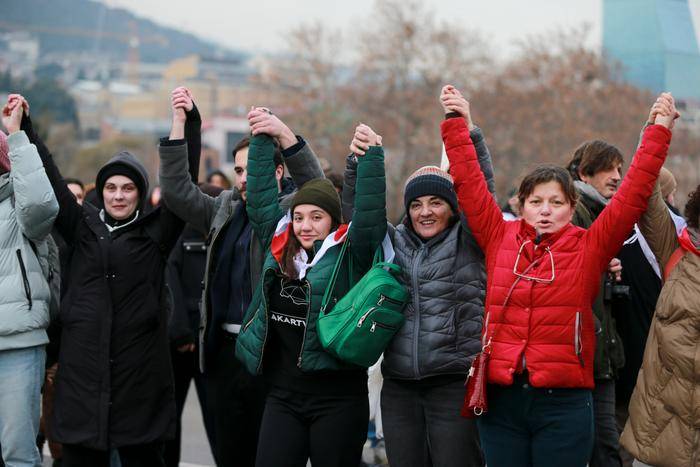Georgia's Pro-EU Movement Gains Momentum as Thousands Form Human Chain in Tbilisi
Tbilisi, Georgia - Thousands of protesters formed a human chain in the heart of Georgia's capital, Tbilisi, as the country's pro-EU movement entered its second month. The demonstration, which was peaceful and well-organized, aimed to show the government's commitment to European integration and to pressure the authorities to implement necessary reforms.
The human chain, which stretched for several kilometers, was made up of people from all walks of life, including students, professionals, and pensioners. Many of the protesters carried EU flags and banners, while others wore pro-EU t-shirts and hats.
The protest movement, which began in March, has been driven by concerns that the government is not doing enough to advance Georgia's EU membership bid. The protesters are demanding that the government implement a range of reforms, including judicial reform, electoral reform, and anti-corruption measures.
"We want to show the government that we are committed to European integration and that we will not give up," said Nino, a 25-year-old protester. "We want to be part of the EU family and to enjoy the same rights and freedoms as EU citizens."
The protest movement has been largely peaceful, with only a few minor incidents reported. However, the authorities have been criticized for their heavy-handed response to the protests, with many protesters detained and charged with minor offenses.
The EU has expressed its support for the protest movement and has called on the Georgian government to respect the rights of protesters and to implement the necessary reforms. The EU's ambassador to Georgia, Carl Hartzell, attended the protest and expressed his solidarity with the protesters.
"The EU is committed to supporting Georgia's European integration and to helping the country to implement the necessary reforms," Hartzell said. "We believe that the protest movement is a legitimate expression of the Georgian people's desire for European integration and for a better future."
The Georgian government has responded to the protests by promising to implement the necessary reforms and to advance the country's EU membership bid. However, many protesters remain skeptical and are demanding concrete actions rather than just promises.
"We want to see concrete results and not just promises," said Giorgi, a 30-year-old protester. "We want to see the government implementing the necessary reforms and taking concrete steps towards EU membership."
The protest movement is expected to continue in the coming weeks, with protesters planning to hold further demonstrations and rallies. The movement has already had a significant impact on Georgian politics, with the government being forced to respond to the protesters' demands.
- _Protest Movement:_ The pro-EU protest movement in Georgia has entered its second month, with thousands of protesters forming a human chain in Tbilisi.
- _Reform Demands:_ The protesters are demanding that the government implement a range of reforms, including judicial reform, electoral reform, and anti-corruption measures.
- _EU Support:_ The EU has expressed its support for the protest movement and has called on the Georgian government to respect the rights of protesters and to implement the necessary reforms.
- _Government Response:_ The Georgian government has promised to implement the necessary reforms and to advance the country's EU membership bid, but many protesters remain skeptical.
- _Government Resistance:_ The Georgian government may resist implementing the necessary reforms, which could lead to further protests and tensions.
- _EU Membership Bid:_ Georgia's EU membership bid is likely to face significant challenges, including opposition from some EU member states and the need for the country to implement significant reforms.
- _Protest Movement Sustainability:_ The protest movement may struggle to sustain itself in the long term, particularly if the government is able to implement some of the demanded reforms.




No comments yet
Be the first to share your thoughts!